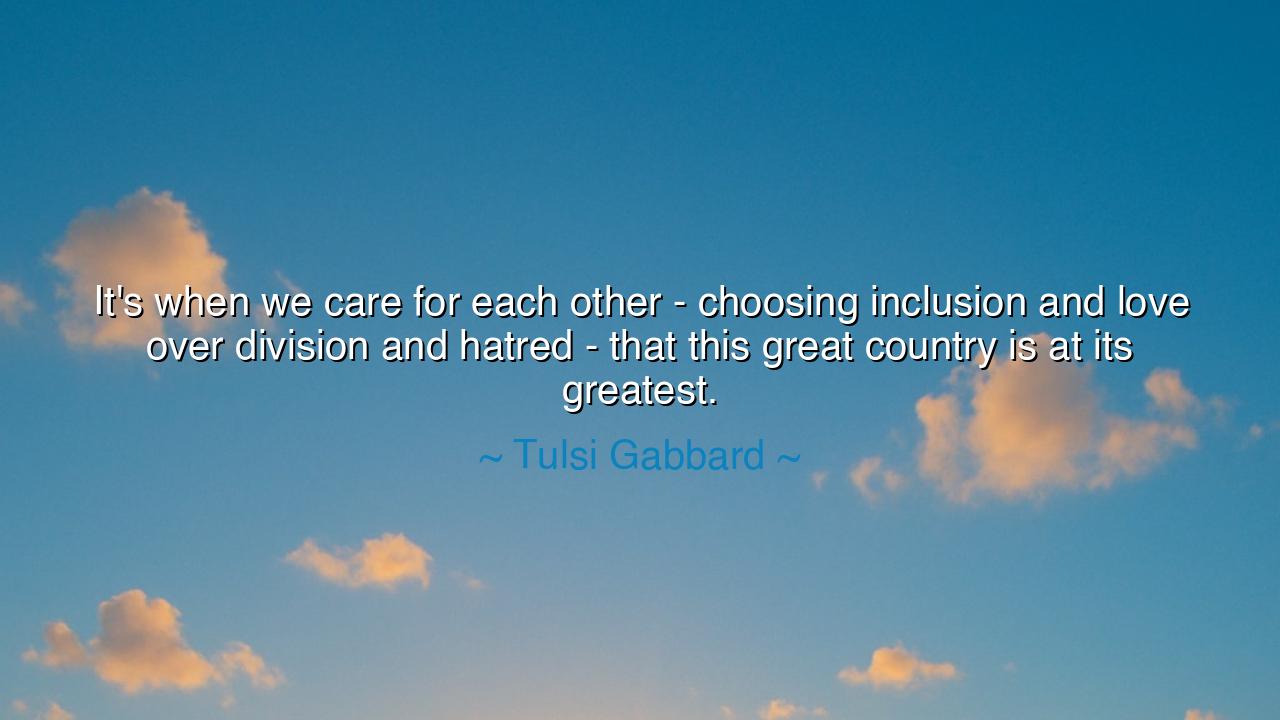
It's when we care for each other - choosing inclusion and love
It's when we care for each other - choosing inclusion and love over division and hatred - that this great country is at its greatest.






“It's when we care for each other — choosing inclusion and love over division and hatred — that this great country is at its greatest.” — Tulsi Gabbard
In these heartfelt and luminous words, Tulsi Gabbard, soldier and stateswoman, calls her people to remember the ancient truth that a nation’s greatness is not measured by its wealth or armies, but by the compassion of its citizens. Her message, though simple in its phrasing, carries the moral weight of centuries — for from the dawn of civilization, unity has always triumphed over division, and love has always proved mightier than hatred. When she speaks of “inclusion and love over division and hatred,” she does not utter mere sentiment; she declares the very law by which societies endure.
The origin of this quote lies in the spirit of Gabbard’s public life — a life shaped by service, both in the military and in the halls of governance. Having witnessed the cost of war and the fragility of peace, she understands that no country can stand strong when its people are torn apart by distrust or anger. Her words reflect a soldier’s humility and a leader’s wisdom: that the true battlefield of the modern age is not fought with weapons, but with hearts — hearts that must learn to choose understanding over fear, and fellowship over pride.
Gabbard’s sentiment echoes a timeless ideal found in the wisdom of the ancients. When Abraham Lincoln spoke of “the better angels of our nature,” he, too, called his nation to remember compassion in a time of strife. And long before him, the philosophers of Greece and the prophets of every faith proclaimed the same truth — that the strength of a people lies not in its divisions, but in its harmony. The great civilizations that endured — from Athens to Ashoka’s India — were those that embraced the many as one. Those that surrendered to hatred, like the city-states of ancient Greece or the empire of Rome, perished beneath the weight of their own discord.
Indeed, history provides countless lessons in the peril of division. Consider the story of the Civil Rights Movement in the United States. It was not anger that reshaped the nation, but love disciplined by courage — the love preached by Dr. Martin Luther King Jr., who faced violence with peace and hatred with grace. When he spoke of creating “a beloved community,” he embodied what Tulsi Gabbard now echoes: that a country achieves its highest form not when its people compete for dominance, but when they rise together for justice, equality, and compassion. Through such love, the wounds of the nation began to heal, proving that unity born of empathy is the truest power on earth.
In her declaration, Gabbard also offers a challenge to the modern soul. The world today, though vast and connected, often seems fractured — divided by race, creed, class, and ideology. Hatred finds many forms: in politics, in prejudice, in the cold indifference of isolation. Yet she reminds us that greatness is a choice, not a circumstance. It is born when each person chooses to care, to include, to extend a hand rather than raise a fist. In this way, every citizen becomes a guardian of the nation’s spirit, and the nation itself becomes a reflection of its people’s compassion.
There is profound wisdom in her insistence that “we care for each other.” For a country, like a body, is only as strong as its bonds. A wound to one part weakens the whole; a kindness to one strengthens all. The ancient Stoics spoke of this when they said that humanity is a single organism, and the good of each is bound to the good of all. So too does Gabbard remind her people that no true patriotism can exist without empathy — that love of country must begin with love of neighbor.
Therefore, O listener of the present age, take this teaching to heart: to build greatness, build love. Seek not victory in debate but understanding in dialogue; defend not your pride, but your shared humanity. Choose to see in others the same divine spark that lives within yourself. For every act of kindness — every bridge built across division — becomes a stone in the foundation of a more perfect nation.
And when the day comes when history looks back upon this generation, may it not be said that we were clever or powerful, but that we were good. For as Tulsi Gabbard reminds us, the greatness of a country is not found in its might, but in its mercy — in the moments when its people, united by love, reveal the very best of what it means to be human. There lies true greatness: in caring, in inclusion, in love eternal.






AAdministratorAdministrator
Welcome, honored guests. Please leave a comment, we will respond soon